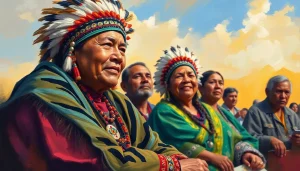From sacred traditions to Silicon Valley startups, Native entrepreneurs are redefining success on their own terms, blending ancient wisdom with modern innovation to empower their communities and reshape the global economy. This remarkable fusion of time-honored practices and cutting-edge technology is not just a passing trend; it’s a powerful movement that’s gaining momentum across the world.
Picture this: a bustling marketplace where traditional crafts meet blockchain technology, or a sustainable energy company powered by both solar panels and ancestral knowledge of the land. These aren’t far-fetched ideas, but real examples of how Indigenous entrepreneurs are empowering communities through business innovation. It’s a fascinating world where the old and new collide, creating sparks of inspiration and change.
But what exactly is indigenous entrepreneurship? It’s not your run-of-the-mill business approach, that’s for sure. Think of it as a unique blend of commercial savvy and cultural preservation, where profit and community benefit walk hand in hand. These enterprising individuals are not just building businesses; they’re weaving the fabric of their heritage into the modern economic tapestry.
The Roots of Indigenous Business: A Journey Through Time
Let’s take a quick trip down memory lane, shall we? Long before the stock market and corporate boardrooms, indigenous communities had their own thriving economic systems. Trade routes crisscrossed continents, with goods and ideas flowing freely between nations. It wasn’t just about making a quick buck; it was about building relationships, honoring the land, and ensuring the well-being of the entire community.
But then came the storm clouds of colonization. Bam! Traditional economies were upended, lands were seized, and cultural practices were suppressed. It was a dark time, with many indigenous communities forced to the margins of the new economic order.
Yet, like a stubborn seed pushing through concrete, indigenous entrepreneurship has experienced a remarkable resurgence in recent decades. It’s like watching a phoenix rise from the ashes, but instead of flames, it’s powered by determination, innovation, and a deep connection to cultural roots.
The Secret Sauce: What Makes Indigenous Entrepreneurship Tick?
So, what’s the special ingredient that sets indigenous entrepreneurship apart? It’s not just about profit margins and market share. Oh no, it goes much deeper than that.
First off, these businesses are often as community-centered as your favorite local coffee shop – but on steroids. Imagine a company where success is measured not just in dollars, but in the smiles of elders, the preservation of languages, and the health of the land. That’s the kind of holistic approach we’re talking about here.
Cultural values aren’t just buzzwords in a mission statement; they’re the very DNA of these enterprises. Traditional knowledge isn’t gathering dust in a museum; it’s being applied to solve modern problems. It’s like watching your grandmother’s wisdom come to life in a high-tech lab coat.
And let’s talk sustainability. Long before it became a corporate buzzword, indigenous communities were living it. These entrepreneurs are taking that age-old respect for the environment and turning it into innovative, eco-friendly business models. It’s like they’ve got a direct hotline to Mother Nature herself.
But perhaps the most striking feature is the focus on collective benefit. In a world obsessed with individual success, these entrepreneurs are flipping the script. They’re asking, “How can this business lift up our entire community?” It’s a refreshing change from the “every person for themselves” mentality, don’t you think?
Climbing Mountains: The Challenges of Indigenous Entrepreneurship
Now, don’t get me wrong. This isn’t all smooth sailing. Indigenous entrepreneurs face some pretty steep challenges. It’s like they’re climbing a mountain with one hand tied behind their back.
First up: money. Or rather, the lack of it. Access to capital is about as rare as a unicorn sighting for many indigenous entrepreneurs. Traditional banks often give them the cold shoulder, and investors can be skeptical of unfamiliar business models. It’s a financial catch-22 that would make Joseph Heller proud.
Then there’s the legal maze. Navigating regulations is tricky enough for any business owner, but for indigenous entrepreneurs, it’s like trying to solve a Rubik’s cube blindfolded. Land rights, treaty obligations, tribal laws – it’s enough to make your head spin.
And let’s not forget about those pesky stereotypes. Some people still think “indigenous business” means selling dreamcatchers by the roadside. (Spoiler alert: it doesn’t.) Breaking through these misconceptions is a constant battle, requiring the patience of a saint and the persistence of a bulldog.
Perhaps the trickiest challenge of all is balancing traditional values with modern business practices. It’s like trying to dance to two different songs at once. How do you honor ancestral wisdom while also embracing new technologies and global markets? It’s a delicate tightrope walk that requires skill, creativity, and a whole lot of heart.
Success Stories: Indigenous Entrepreneurs Changing the Game
But here’s the good news: despite these challenges, indigenous entrepreneurs are knocking it out of the park. They’re not just surviving; they’re thriving, innovating, and inspiring others along the way.
Take, for example, the story of a small indigenous-owned tech company in Canada. They’ve developed an app that helps preserve endangered languages, combining cutting-edge AI with traditional storytelling techniques. It’s like Duolingo met a tribal elder and had a really cool baby.
Or how about the Australian indigenous-owned mining company that’s setting new standards for environmental responsibility and community engagement? They’re proving that you can extract resources without extracting the soul of the land.
These success stories aren’t just feel-good tales; they’re having real, tangible impacts on their communities. Jobs are being created, cultural practices are being preserved, and a new generation of indigenous youth is being inspired to dream big.
Lending a Hand: Support Systems for Indigenous Entrepreneurs
Thankfully, indigenous entrepreneurs aren’t fighting this battle alone. There’s a growing network of support systems and resources designed to help these innovative individuals thrive.
Governments are (finally) starting to wake up to the potential of indigenous entrepreneurship. Policies are being crafted, funds are being allocated, and doors are being opened. It’s like watching a slow-moving bureaucratic giant finally decide to lend a hand.
Non-profit organizations and business incubators focused on indigenous entrepreneurship are popping up like mushrooms after rain. They’re providing everything from mentorship to office space, helping turn bright ideas into thriving businesses.
Education is also playing a crucial role. Universities and colleges are developing programs specifically tailored to indigenous business practices. It’s like they’re creating a whole new textbook, one that combines MBA know-how with traditional knowledge.
And let’s not forget about the power of networking. Indigenous business communities are coming together, sharing knowledge, and supporting each other. It’s like a digital potlatch, where instead of goods, people are exchanging ideas and opportunities.
The Road Ahead: The Future of Indigenous Entrepreneurship
As we look to the future, the potential of indigenous entrepreneurship is as vast as the lands these communities have stewarded for millennia. We’re not just talking about economic empowerment; we’re talking about a fundamental shift in how we think about business, success, and our relationship with the world around us.
Impact entrepreneurship is driving positive change through business innovation, and indigenous entrepreneurs are at the forefront of this movement. They’re showing us that it’s possible to build thriving businesses while also honoring cultural traditions and protecting the environment.
The ripple effects of this movement extend far beyond indigenous communities. Asian entrepreneurs are pioneering innovation and success in the global business landscape, often drawing inspiration from indigenous models of sustainable development. Similarly, immigrant entrepreneurship is driving innovation and economic growth in host countries, bringing diverse perspectives and practices to the table.
Community entrepreneurship is driving local innovation and economic growth, and indigenous businesses are often at the heart of these efforts. They’re proving that local entrepreneurs can drive community growth and innovation in ways that big corporations simply can’t match.
As we celebrate the successes of indigenous entrepreneurs, it’s important to recognize that this journey is part of a broader movement towards inclusive entrepreneurship, fostering diversity and innovation in business. Minority entrepreneurs are overcoming challenges and achieving success in business, paving the way for a more equitable and diverse business landscape.
Indian entrepreneurs are driving innovation and economic growth in the global market, often drawing on ancient wisdom and practices in their approach to business. This global perspective reminds us that indigenous entrepreneurship is not just a local phenomenon, but a worldwide movement with the power to reshape our economic future.
So, what can we do? How can we support this incredible movement? It’s simple, really. Seek out and support indigenous-owned businesses. Educate yourself about the challenges and opportunities in this space. And most importantly, recognize that indigenous entrepreneurship isn’t just about economic development – it’s about cultural preservation, environmental stewardship, and building a more inclusive and sustainable world for all of us.
In the end, the rise of indigenous entrepreneurship isn’t just a story about business. It’s a story about resilience, innovation, and the power of staying true to one’s roots while reaching for the stars. It’s a reminder that sometimes, the best way to move forward is to look back, to draw strength and wisdom from the past as we build a better future.
So the next time you’re looking for a product or service, why not seek out an indigenous-owned business? You might just find that you’re not only getting a great product, but you’re also becoming part of a movement that’s changing the world, one enterprise at a time. After all, in the grand tapestry of global business, it’s these unique threads of indigenous entrepreneurship that add the most vibrant and meaningful colors.
References:
1. Dana, L. P. (2015). Indigenous entrepreneurship: An emerging field of research. International Journal of Business and Globalisation, 14(2), 158-169.
2. Hindle, K., & Lansdowne, M. (2005). Brave spirits on new paths: Toward a globally relevant paradigm of indigenous entrepreneurship research. Journal of Small Business & Entrepreneurship, 18(2), 131-141.
3. Peredo, A. M., & Anderson, R. B. (2006). Indigenous entrepreneurship research: Themes and variations. In C. S. Galbraith & C. H. Stiles (Eds.), Developmental Entrepreneurship: Adversity, Risk, and Isolation (pp. 253-273). Emerald Group Publishing Limited.
4. Foley, D. (2003). An examination of Indigenous Australian entrepreneurs. Journal of Developmental Entrepreneurship, 8(2), 133-151.
5. Anderson, R. B., Dana, L. P., & Dana, T. E. (2006). Indigenous land rights, entrepreneurship, and economic development in Canada: “Opting-in” to the global economy. Journal of World Business, 41(1), 45-55.
6. Gallagher, B., & Selman, M. (2015). Warrior entrepreneur: Developing global resilience serves both business and community. Journal of Entrepreneurship in Emerging Economies, 7(3), 290-301.
7. Verbos, A. K., Henry, E., & Peredo, A. M. (2017). Indigenous aspirations and rights: The case for responsible business and management. Routledge.
8. Colbourne, R. (2017). Indigenous entrepreneurship and hybrid ventures. In A. C. Corbett & J. A. Katz (Eds.), Hybrid Ventures (pp. 93-149). Emerald Publishing Limited.
9. Giovannini, M. (2015). Indigenous community enterprises in Chiapas: a vehicle for buen vivir? Community Development Journal, 50(1), 71-87.
10. Overall, J., Tapsell, P., & Woods, C. (2010). Governance and indigenous social entrepreneurship: When context counts. Social Enterprise Journal, 6(2), 146-161.












Would you like to add any comments? (optional)